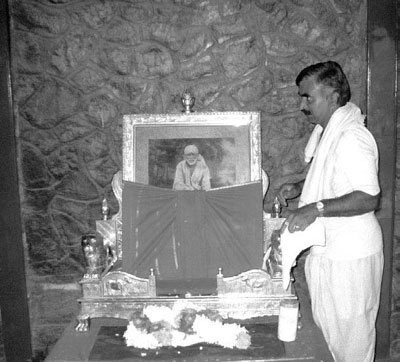Over time, the moving from Dwarkamai to the Chavadi took on the form of a grand affair. This was thanks largely to the efforts of Radhakrishnayi, who wanted Baba to be honoured as a Maharajah, and supplied all sorts of ceremonial regalia. With the bedecked horse Shyam Sunder leading the way, Baba followed with Tatya on one side and Mhalsapati on the other, walking on carpets laid on the path. A crowd of people accompanied them, singing bhajan and dancing, playing musical instruments, shouting Baba's name, letting off fireworks, holding a silver umbrella over Baba, waving flags and fans, and chanting Hari-nama. The distance of a few metres took up to three hours to cover. Years earlier, Baba had predicted such scenes when talking to a few devotees, "In Shirdi there will be huge storeyed buildings, grand processions will be held, and big men will come. Chariots, horses, elephants will come, guns will be fired..."

Once again, one cannot help marvelling at Baba. We know that he did not like such pomp and paraphernalia and we have seen the importance to him of holy poverty (faqiri) and
his reluctance to allow devotees to worship him, yet here he was allowing himself to be led to the Chavadi in an extravagant display of adoration. In describing the scene a few moments before the procession, Hemadpant hints at Baba's response. People were singing bhajan, some were decorating the palanquin, rows of oil lamps were burning, Shyam Sunder stood waiting fully decorated, "then Tatya Patil came to Baba with a party of men and asked him to get ready. Baba sat quiet in his place till Tatya came and helped him to get up by putting his arm under Baba's armpit" (Ch. 37). Clearly, Baba was not eagerly waiting to begin - in fact, we may sense a certain resignation - yet he went ahead with it, not just once, but hundreds of times! Again and again this scene was re-enacted, and it is one replete with poignancy and poetic tension. A great saint, adored as a living deity, but to whom any personal worship was distasteful, yet allowing it out of love for his devotees and a sympathy for their human longings and affection.


